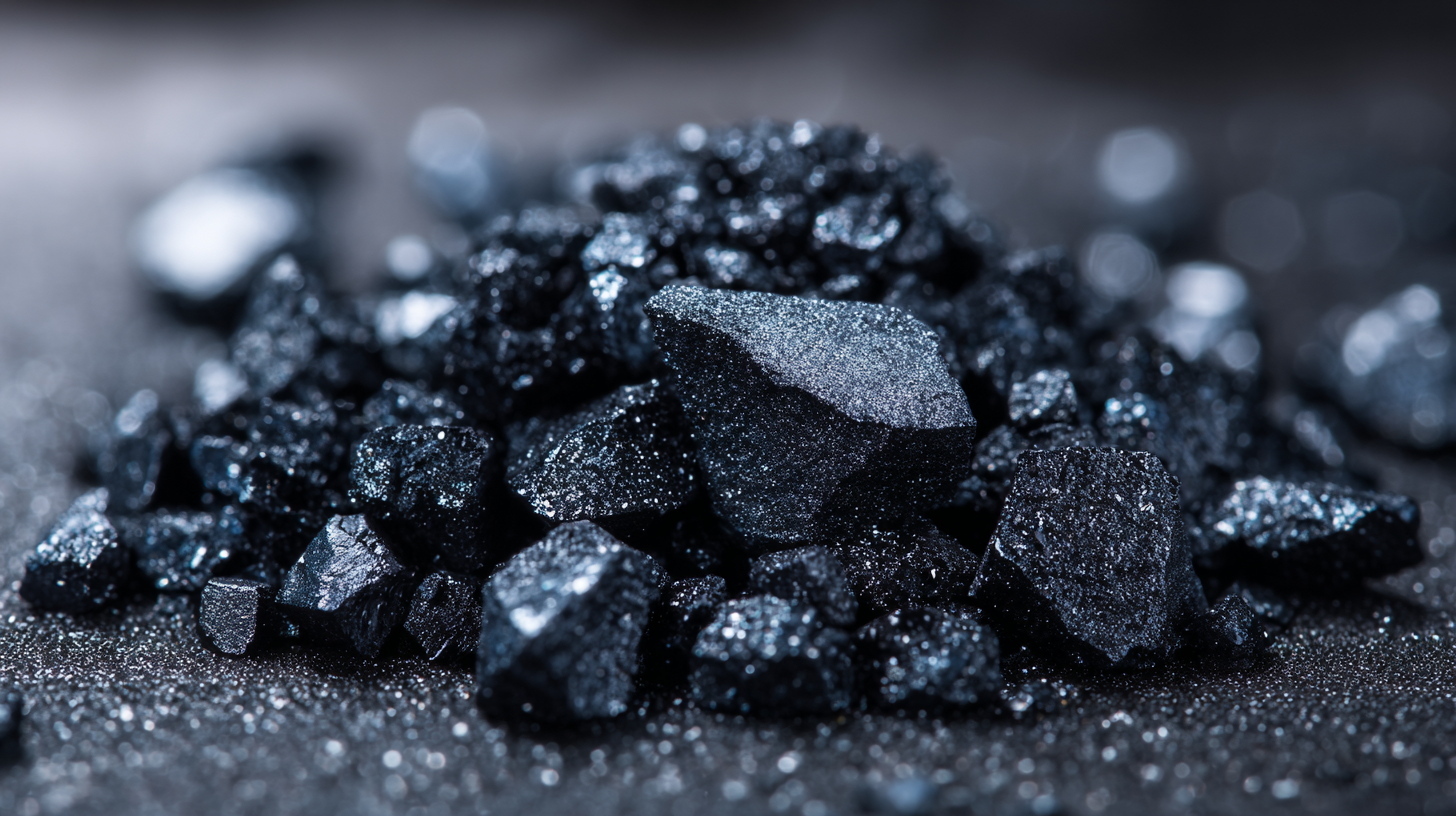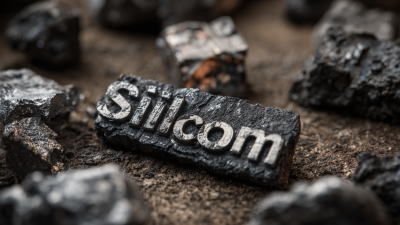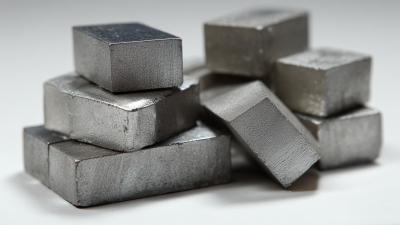Leave Your Message
Black Silicon Carbide (SiC) has emerged as a pivotal material in various modern industries, ranging from electronics to automotive and renewable energy sectors. According to a recent report by Mordor Intelligence, the global silicon carbide market is projected to reach USD 5.23 billion by 2026, reflecting an impressive CAGR of 20.6% from 2021 to 2026. This surge in demand is fueled by Black Silicon Carbide's superior properties, including high thermal conductivity, excellent electrical resistance, and exceptional hardness, making it ideal for applications such as abrasives, semiconductors, and as components in photovoltaic systems.

As industries strive for efficiency and sustainability, Black Silicon Carbide is positioned to play a crucial role in developing innovative technologies and driving advancements in performance across multiple applications. Unveiling the mysteries of this remarkable material will provide valuable insights into its transformative potential in modern manufacturing and energy solutions.
Black silicon carbide (SiC) has emerged as a critical material in modern industries due to its unique properties, such as exceptional thermal conductivity, high hardness, and outstanding electrical performance. These qualities position SiC as a superior component in high-performance applications, particularly in power electronics and semiconductor devices. Notably, it is increasingly being adopted in sectors like electric vehicles and renewable energy where energy efficiency and heat management are paramount.
Tips: When considering SiC for your projects, it’s essential to evaluate both performance and cost factors. Keep an eye on the evolving market dynamics, as fluctuations in substrate pricing can impact overall project budgets. Additionally, lightweight and efficient SiC modules can significantly enhance your products' competitiveness.
The ongoing partnership between industry leaders to enhance SiC technology underlines its growing importance. Recent developments have highlighted the need for improved yield rates and localized manufacturing processes, which are imperative for the scalability of SiC applications. As trends indicate, SiC's role will only expand, driving innovation across various fields and potentially transforming how power electronics are designed and implemented.
| Property | Description | Industrial Applications |
|---|---|---|
| High Hardness | Black Silicon Carbide is one of the hardest materials known, making it ideal for abrasive applications. | Used in grinding wheels, sandpapers, and cutting tools. |
| Thermal Conductivity | Excellent thermal conductivity allows efficient heat transfer. | Utilized in electronic devices and heat sinks. |
| Chemical Resistance | Resists chemical weathering and degradation under harsh environments. | Applied in chemical processing and in components exposed to corrosive substances. |
| Dielectric Strength | High dielectric strength makes it suitable as an insulator. | Used in electrical insulation applications. |
| Low Expansion Coefficient | Minimizes thermal expansion under high temperatures. | Ideal for precision instruments and components in high-temperature environments. |
The demand for black silicon carbide (SiC) is witnessing significant growth across various industrial sectors, driven primarily by the increasing emphasis on energy efficiency and performance. Recent trends highlight that the market for silicon carbide power semiconductors is expanding rapidly, fueled by its role in enhancing the efficiency of electronic devices and renewable energy technologies. As industries seek solutions that reduce energy consumption and improve overall productivity, black silicon carbide stands out due to its superior thermal and electrical conductivity.
Moreover, from February to early March, the market experienced fluctuations, particularly with spot silicon metal prices reflecting a subdued trend. This decline is indicative of broader market dynamics, wherein demand for high-performance materials like black silicon carbide is consistently rising despite short-term pricing pressures. The rising adoption of SiC in electric vehicles and power electronics further underscores its pivotal role in the transition to sustainable energy solutions, thereby solidifying its position in modern industries.

Black silicon carbide (SiC) has gained significant traction in various industrial applications due to its unique properties. When comparing black silicon carbide to traditional abrasive materials such as aluminum oxide and diamond, it becomes evident that each possesses distinct advantages that cater to specific needs.
For instance, black silicon carbide is characterized by its sharp, angular grains, which allow for efficient cutting and grinding, particularly on hard materials. This makes it an excellent choice for industries that require precision, such as ceramics and glass production.
In contrast, aluminum oxide, while more commonly used, tends to wear down faster and is better suited for softer applications. Diamond abrasives, on the other hand, excel in durability and cutting speed but come with a significantly higher cost. Therefore, the choice between these materials often hinges on the specific requirements of the task at hand, such as the type of material being worked on and budget constraints.
Black silicon carbide strikes a balance between performance and cost-effectiveness, making it an invaluable asset across modern industries.
 Black silicon carbide (SiC), a unique semiconductor material, plays a crucial role in modern industries due to its exceptional hardness and thermal conductivity. The manufacturing process of black silicon carbide begins with the fusion of silica sand and carbon in an electric arc furnace. This high-temperature environment facilitates the chemical reaction between silica and carbon, producing silicon carbide crystals. The careful control of temperature and the ratio of materials not only influences the quality of the crystals but also dictates the final color; the black hue arises from the presence of additional impurities and the specific processing conditions.
Black silicon carbide (SiC), a unique semiconductor material, plays a crucial role in modern industries due to its exceptional hardness and thermal conductivity. The manufacturing process of black silicon carbide begins with the fusion of silica sand and carbon in an electric arc furnace. This high-temperature environment facilitates the chemical reaction between silica and carbon, producing silicon carbide crystals. The careful control of temperature and the ratio of materials not only influences the quality of the crystals but also dictates the final color; the black hue arises from the presence of additional impurities and the specific processing conditions.
Once the raw black silicon carbide is produced, it undergoes a refinement process to enhance its purity and characteristics. This often involves grinding, screening, and flotation techniques that separate the desired SiC particles from other materials and contaminants. The final product must meet strict standards based on its intended application, whether it be in abrasives, cutting tools, or semiconductor devices. The refined black silicon carbide is then available in various grades, ensuring that it meets the demands of advanced technological applications across diverse industries.
The increasing focus on sustainability in modern industries has led to the exploration of materials that not only enhance performance but also align with eco-friendly practices. Black silicon carbide has emerged as a key player in this arena, offering a range of benefits that contribute to greener manufacturing processes. As a semiconductor material, it is celebrated for its high thermal conductivity and chemical resistance, making it ideal for various applications, including solar cells and electric vehicle components, where energy efficiency is paramount.
Moreover, the production of black silicon carbide can be more environmentally friendly compared to traditional materials. Its synthesis often involves less energy-intensive methods and generates fewer harmful byproducts. This aligns with the global push towards reducing carbon footprints and minimizing environmental impact. By embracing black silicon carbide, industries not only improve their sustainability credentials but also gain a competitive edge in a market increasingly driven by eco-conscious consumers and regulations. Thus, its role in promoting sustainable practices marks a significant step towards a greener industrial landscape.
This chart represents the market share distribution of black silicon carbide across various industries, highlighting its significant roles in electronics, abrasives, LEDs, solar cells, and refractories, emphasizing its relevance in sustainable and eco-friendly practices.






